

Instructional scaffolding. Support given to a student by an instructor throughout the learning process Instructional scaffolding is the support given to a student by an instructor throughout the learning process.
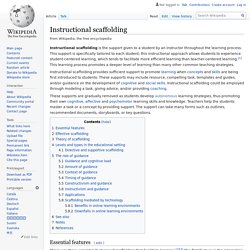
This support is specifically tailored to each student; this instructional approach allows students to experience student-centered learning, which tends to facilitate more efficient learning than teacher-centered learning.[1] This learning process promotes a deeper level of learning than many other common teaching strategies. Instructional scaffolding provides sufficient support to promote learning when concepts and skills are being first introduced to students.
These supports may include resource, compelling task, templates and guides, and/or guidance on the development of cognitive and social skills. Instructional scaffolding could be employed through modeling a task, giving advice, and/or providing coaching. Essential features[edit] Effective scaffolding[edit] Theory of scaffolding[edit] Applications[edit] Challenge. Page 2: How Do I Scaffold Instruction? There are no hard-and-fast rules for how to scaffold instruction.
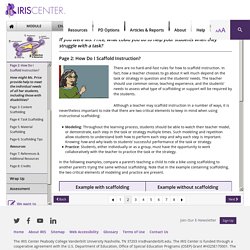
In fact, how a teacher chooses to go about it will much depend on the task or strategy in question and the students’ needs. The teacher should use common sense, teaching experience, and the students’ needs to assess what type of scaffolding or support will be required by the students. Although a teacher may scaffold instruction in a number of ways, it is nevertheless important to note that there are two critical elements to keep in mind when using instructional scaffolding: Modeling: Throughout the learning process, students should be able to watch their teacher model, or demonstrate, each step in the task or strategy multiple times.
6 Scaffolding Strategies to Use With Your Students. What’s the opposite of scaffolding a lesson? Saying to students, “Read this nine-page science article, write a detailed essay on the topic it explores, and turn it in by Wednesday.” Yikes! No safety net, no parachute—they’re just left to their own devices. Conscious Competence Model – BusinessBalls.com. The earliest origins and various definitions of the 'conscious competence' learning theory are uncertain and could be very old indeed; perhaps thousands of years.
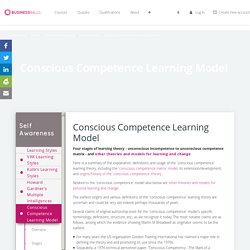
Several claims of original authorship exist for the 'conscious competence' model's specific terminology, definitions, structure, etc., as we recognize it today. The most notable claims are as follows, among which the evidence showing Martin M Broadwell as originator seems to be the earliest. These claims, with discussion of other influential/contributing/promotional origins of the 'conscious competence' theory and its modern definitions are shown below, see conscious competence model origins. The conscious competence theory and related matrix model explain the process and stages of learning a new skill (or behaviour, ability, technique, etc.) Stages Put simply: The ECRIF Stages - ECRIF: Seeing Learning. SIT Graduate Institute. Consider how you would use the credits.
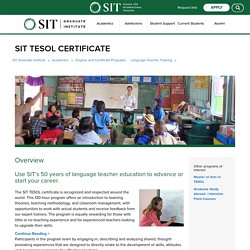
If you are interested in pursuing this option you should check with the Registrar's Office at whatever college or university you are attending or plan to attend. Of the five graduate credits, up to two may be applied toward SIT Graduate Institute’s on-campus MA in TESOL program, and these would take the place of the two one-credit electives. (Please note, it is not possible to apply any of the five credits toward SIT's online MA in TESOL program.) Passport to Teach 2017. Copyright © 2017 Teach Away We'll share with you the tips, tricks, and inspiration you need to get that resume and job application right, plus comprehensive job guides covering most of our current teaching positions.

15 Ways to Check for Understanding. Nothing’s worse than being met with a sea of blank faces at the end of a lesson. That’s why it’s so important to frequently check for understanding with your students. Here are fifteen simple ways to see who’s good to go, who’s almost there and who needs some one-on-one. 1. Use check marks. The TESOL Teacher of the Year Award. Who's Eligible?

Any English language teacher who has been a classroom teacher for a minimum of three years is not a previous recipient of this award or the TESOL Excellence in Teaching Award Note: Applicants are not required to be members of TESOL International Association. Purpose. The Power of Perspective: Three ways to change your problem solving perspective. “If you change the way you look at things, the things you look at change” Wayne Dyer Many of us may be familiar with the parable of The Elephant.
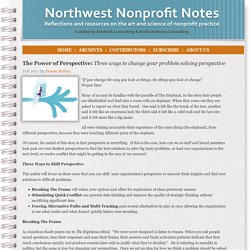
In the story four people are blindfolded and lead into a room with an elephant. When they come out they are asked to report on what they found. One said it felt like the trunk of the tree, another said it felt like an enormous leaf, the third said it felt like a solid wall and the last one said it felt more like a big snake. 15 Get-to-know-you Games For Groups Of Strangers - Uplift Events Blog.
Games, ideas, icebreakers, activities for youth groups, youth ministry and churches. Kelly - David Kolb, The Theory of Experiential Learning and ESL. The Internet TESL Journal Curtis Kellyctskelly [at] [at] gray.plala.or.jpHeian Jogakuin College (Osaka, Japan)
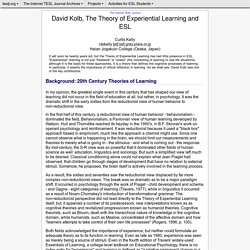
EFL/ESL Articles from The Internet TESL Journal. If you would like to submit an article, please read our Submission Policy.
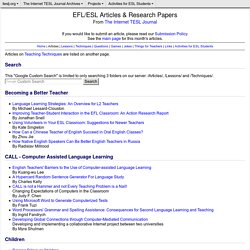
See the main page for this month's articles. Home | Articles | Lessons | Techniques | Questions | Games | Jokes | Things for Teachers | Links | Activities for ESL Students Articles on Teaching Techniques are listed on another page. Search. 15 ideas for checking answers. ESL Reading Log. BBC Learning English - Syllabus: Intermediate. CCQs and ICQs – a mental exercise.
I’ve recently caught myself asking a lot of CCQs (concept checking questions).
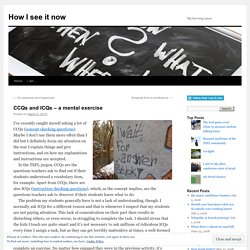
Maybe I don’t use them more often than I did but I definitely focus my attention on the way I explain things and give instructions, and on how my explanations and instructions are accepted. In the TEFL jargon, CCQs are the questions teachers ask to find out if their students understood a vocabulary item, for example. Apart from CCQs, there are also ICQs (instruction checking questions), which, as the concept implies, are the questions teachers ask to discover if their students know what to do.
The problem my students generally have is not a lack of understanding, though. I normally ask ICQs for a different reason and that is whenever I suspect that my students are not paying attention. The situation gets worse whenever I ask the kids to open their coursebooks and complete an exercise. The ECRIF Stages - ECRIF: Seeing Learning. Classroom Management Definition - The Glossary of Education Reform.
Classroom management refers to the wide variety of skills and techniques that teachers use to keep students organized, orderly, focused, attentive, on task, and academically productive during a class. When classroom-management strategies are executed effectively, teachers minimize the behaviors that impede learning for both individual students and groups of students, while maximizing the behaviors that facilitate or enhance learning. Generally speaking, effective teachers tend to display strong classroom-management skills, while the hallmark of the inexperienced or less effective teacher is a disorderly classroom filled with students who are not working or paying attention.
While a limited or more traditional interpretation of effective classroom management may focus largely on “compliance”—rules and strategies that teachers may use to make sure students are sitting in their seats, following directions, listening attentively, etc. Reform Debate. Vocabulary Skills: Computers & Technology. Kolb's Learning Styles and Experiential Learning Cycle. Kolb's Learning Styles and Experiential Learning Cycle By Saul McLeod, updated 2017 David Kolb published his learning styles model in 1984 from which he developed his learning style inventory.
Kolb's experiential learning theory works on two levels: a four-stage cycle of learning and four separate learning styles. Part of Speech. DIGPA - The Amazing World of Teaching.